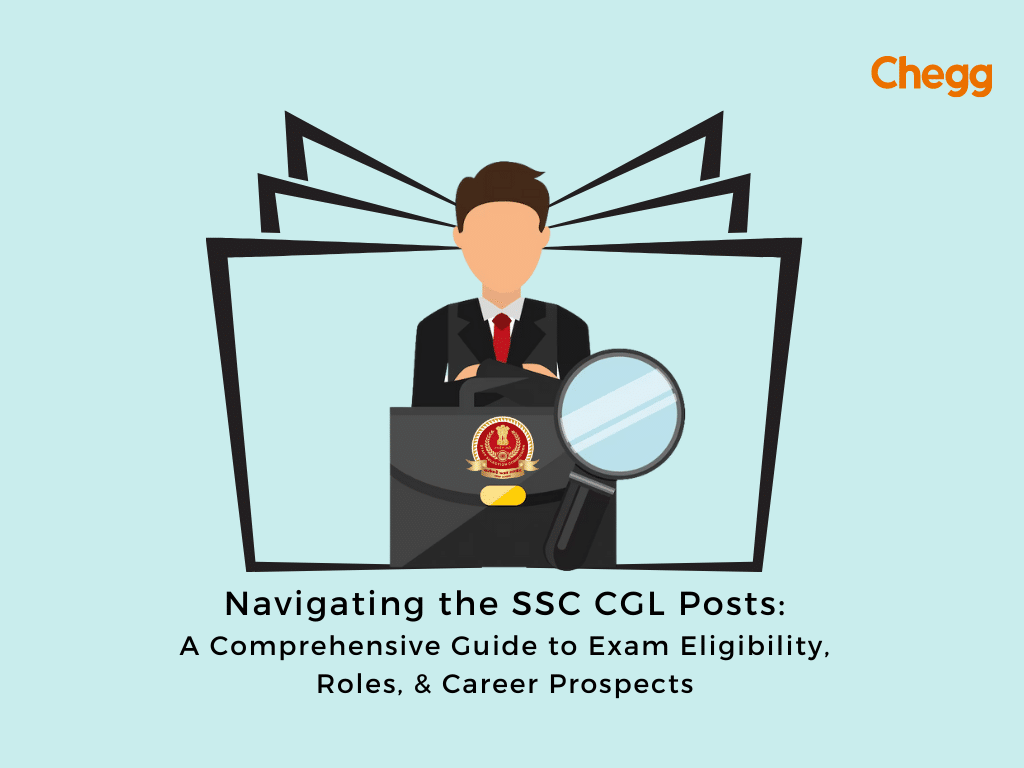
The Staff Selection Commission (SSC) has released 14,582 vacancies across more than 30 SSC CGL posts for recruitment to Group B and Group C positions in various Central Government departments and ministries.
Key Group B posts include Assistant Section Officer (in Central Secretariat Service, Intelligence Bureau, Railways, MEA, AFHQ, MEIT, and other ministries), Income‑Tax Inspector, Central Excise Inspector, Preventive Officer, Examiner, Assistant Enforcement Officer, Sub‑Inspector (CBI, NIA, NCB), Section Head (DGFT), and Office Superintendent (CBDT).
Group C posts include Auditor, Accountant/Junior Accountant, Postal Assistant/Sorting Assistant, Senior Secretariat Assistant, Tax Assistant, and statistical roles such as Junior Statistical Officer and Statistical Investigator.
Clearing the SSC CGL exam offers excellent career opportunities, with pay scales ranging from Level-07 (₹25,500–81,100) to Level-09 (₹44,900–1,42,400). For graduate candidates aiming for a Central Government job, SSC CGL posts provide attractive pay, career growth, and job security.

The SSC CGL 2025 exam is being conducted to fill 14,582 vacancies across Group B and Group C posts in the Central Government. The posts cover administrative, investigative, financial, statistical, and clerical roles, with pay levels ranging from Level 4 to Level 7. This highly competitive national-level exam is conducted in four tiers (I–IV). SSC CGL posts are popular due to their stable career paths, structured promotions, and attractive pay ranging from ₹25,500 to ₹1,42,400.
SSC CGL Post List by Pay Level:
Pay Level 7 (Group B/C)
Pay Level 6 (Group B)
Pay Level 5 (Group C)
Pay Level 4 (Group C)
The term “SSC CGL job” refers to the positions or roles that candidates can secure through the SSC CGL (Staff Selection Commission Combined Graduate Level) examination. This exam, conducted by the Staff Selection Commission (SSC), recruits candidates for various posts in central government departments and ministries.
The SSC CGL examination provides access to a variety of posts, each offering distinct responsibilities and career growth opportunities. Here’s an overview of some key positions available through SSC CGL:
Having discussed the various posts under SSC CGL, let’s now look at the salaries offered for these positions. Salaries may vary based on the location of posting and the specific government department. Below is an overview of the salary ranges for some key SSC CGL posts:
| SSC CGL Post | Salary Range (INR) |
|---|---|
| Assistant Audit Officer (AAO) | 56,100 – 1,77,500 |
| Assistant Accounts Officer (AAO) | 56,100 – 1,77,500 |
| Assistant Section Officer (ASO) | 44,900 – 1,42,400 |
| Inspector (Central Excise / Preventive Officer / Examiner) | 44,900 – 1,42,400 |
| Income Tax Inspector (ITI) | 44,900 – 1,42,400 |
| Sub Inspector (SI) – CBI | 44,900 – 1,42,400 |
| Assistant Enforcement Officer (AEO) | 44,900 – 1,42,400 |
| Assistant (Ministry of External Affairs) | 44,900 – 1,42,400 |
| Inspector of Posts (IP) | 35,400 – 1,12,400 |
| Statistical Investigator (Grade-II) | 35,400 – 1,12,400 |
| Junior Statistical Officer (JSO) | 35,400 – 1,12,400 |
| Tax Assistant (TA) | 25,500 – 81,100 |
| SSC CGL Post | Salary Range (INR) |
|---|---|
| Assistant Audit Officer (AAO) | 56,100 – 1,77,500 |
| Assistant Accounts Officer (AAO) | 56,100 – 1,77,500 |
| Assistant Section Officer (ASO) | 44,900 – 1,42,400 |
| Inspector (Central Excise / Preventive Officer / Examiner) | 44,900 – 1,42,400 |
| Income Tax Inspector (ITI) | 44,900 – 1,42,400 |
| Sub Inspector (SI) – CBI | 44,900 – 1,42,400 |
| Assistant Enforcement Officer (AEO) | 44,900 – 1,42,400 |
| Assistant (Ministry of External Affairs) | 44,900 – 1,42,400 |
| Inspector of Posts (IP) | 35,400 – 1,12,400 |
| Statistical Investigator (Grade-II) | 35,400 – 1,12,400 |
| Junior Statistical Officer (JSO) | 35,400 – 1,12,400 |
| Tax Assistant (TA) | 25,500 – 81,100 |
Many candidates often ask which is the “best” SSC CGL post. However, the ideal post varies for each individual, depending on personal interests, career goals, and preferences. Here are some key factors to consider when choosing the most suitable post:
The SSC CGL examination and the wide range of posts it offers are highly significant for aspirants aiming for a stable and rewarding career in the government sector. Here’s why SSC CGL posts and their salaries matter:
By selecting the right SSC CGL post based on personal interests, skills, and career goals, aspirants can embark on a fulfilling and successful journey in the government sector.
When candidates begin preparing for the SSC CGL exam, many aim for the highest-paying post. The Assistant Audit Officer (AAO) is the top-paying position in SSC CGL, with salaries varying by city: ₹65,318 in X city, ₹59,434 in Y city, and ₹55,626 in Z city. Salaries for all posts differ across cities due to variations in HRA and other allowances. A complete list of SSC CGL posts along with their salaries is provided in this article, and it is recommended to go through it thoroughly.
In conclusion, SSC CGL offers a wide range of posts, providing aspirants with multiple opportunities to build a rewarding career in the government sector. By understanding the responsibilities, pay scales, and growth prospects of each post, candidates can make well-informed choices and embark on a successful professional journey.

Recommended Reads:
Ans. The highest-paid post through the SSC CGL exam is Assistant Audit Officer (AAO) under the Indian Audit and Accounts Department, with a salary range of ₹47,600 to ₹1,51,100.
Ans. SSC CGL is often called “mini-IAS” because you can receive the same rank in later service that a UPSC selected applicant gets in their first stage.
Ans. SSC CGL offers approximately 30 to 40 different posts across various departments.
Ans. Assistant Audit, Accounts, and Income Tax Officers are some of the highest-paying positions in the SSC CGL exam.
Ans. The best posts to aim for under the SSC CGL exam:
Income Tax Inspector
Assistant Section Officer
Central Excise Inspector
Assistant Audit Officer
Public Finance
Assistant Enforcement Officer
Cracking CGL in just 15 days is tough, but not impossible if your basics are strong and you’ve studied earlier. Focus only on revision, mock tests, and previous year papers to make the most of this short time.

Authored by, Nidhi Kukreja
Exam Prep Advisor
Nidhi is a passionate writer who specializes in long-form, research-backed content that delivers real value. Whether she’s writing blog articles or creating educational modules, she focuses on making complex topics clear, detailed, and easy to understand. Her content is designed to build knowledge and credibility, helping readers gain deeper insights with every piece.
Editor's Recommendations
Chegg India does not ask for money to offer any opportunity with the company. We request you to be vigilant before sharing your personal and financial information with any third party. Beware of fraudulent activities claiming affiliation with our company and promising monetary rewards or benefits. Chegg India shall not be responsible for any losses resulting from such activities.
Chegg India does not ask for money to offer any opportunity with the company. We request you to be vigilant before sharing your personal and financial information with any third party. Beware of fraudulent activities claiming affiliation with our company and promising monetary rewards or benefits. Chegg India shall not be responsible for any losses resulting from such activities.